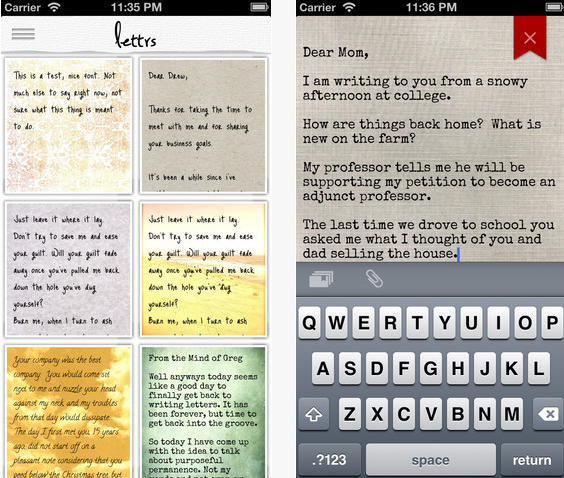Lettrs App Lets Users Send Snail Mail From iPhone
The advent of social media, smartphones, Twitter and even email has ushered in an age of constant communication. But in a time when we can contact friends and loved ones instantly, the quality of the content—the art of writing a letter—is becoming an antiquated skill of the past. People spend more time mastering their abilities to express ideas in 140 characters or less than to write detailed, descriptive thoughts that paint a picture for the reader.
One tech startup hopes to reverse that trend however. Lettrs recently launched a first-of-its kind mobile app that allows users to create, manage and deliver paper or digital letters from their iPhones. The new app follows lettrs Web platform released last year, and both are designed to allow users to slow down their communications and catch up on the letters they stopped writing when the world entered the digital communication era.
There’s just something special about getting a letter in the mail According to lettrs, approximately 40 billion letters are stored in boxes, drawers and basements across the United States. As opposed to email, a letter indicates the sender took extra time to choose specific words and thoughts. Lettrs allows users to customize letters with more than 20 fonts and themes or even upload a handwritten note using iPhone’s camera. Letters can then be sent digitally or—for a nominal fee—in a hand-addressed, wax-sealed envelope through the mail.
“The introduction of the lettrs mobile app is another major step toward our goal of making letter-writing relevant and easily accessible for anyone anywhere, at any time,” said CEO and co-founder Drew Bartkiewicz. “In an age when most social media missives are quick hits without a great deal of thought behind them, I feel very strongly that people are hungry for more meaningful and deliberate communication in their lives. The lettrs mobile app is all about making the process of letter-writing much more convenient, purposeful and lasting.”
If lettrs catches on, it could also give the post office some much needed business. A 2011 Bloomberg BusinessWeek report discussed factors contributing to the decline of the United States Postal Service, including email and online communication. First-class mail—from which the USPS traditionally earned the majority of its revenue—was steadily declining and fell below junk mail for the first time in 2005. In fact, between 2006 and 2010 total mail volume fell 20 percent, and the USPS didn’t earn enough revenue to cover its operating expenses for three years straight.
“With the rise of e-mail and the decline of letters, mail volume is falling at a staggering rate, and the postal service’s survival plan isn’t reassuring,” Devin Leonard says in the Bloomberg BusinessWeek report.
Could a resurgence of letter-writing—catered to the digital age—lead the post office to recovery? One expert certainly believes the app could repopularize letters.
“The lettrs mobile app effectively brings the post office with you wherever you are,” said John Callan, founder of PostalVision and a 30-year postal industry veteran. “The ability to create and mail a physical letter right from the iPhone is truly an innovation that should be embraced by the U.S. Postal Service, and by anyone who wishes to engage with others through a personal letter. I believe this application will energize an entirely new wave of the timeless art of personal letter writing.”
To kick off the launch of its new $2.99 app and get potential users excited about writing letters, lettrs is offering a special promotion now through Mother’s Day. Users can deliver as many as five free paper-post letters anywhere in the world by using the app or by entering the code “mother” when choosing the “best” option on lettrs.com. Lettrs will convert users’ messages onto scented fine linen parchment, folded in colorful hand-crafted wrap, sealed with a wax stamp and in a hand-addressed envelope. After Mother’s Day the standard cost will be between $2 and $6 for paper-post letters, while digitally-delivered letters will remain free.










































